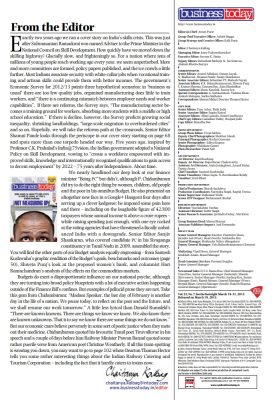Not Measuring Up
[Business Today]
Published date: 31st Mar 2013
Exactly two years ago we ran a cover story on India’s skills crisis. This was just after Subramanian Ramadorai was named Adviser to the Prime Minister in the National Council on Skill Development. How quickly have we moved down the skilling highway? Glacially slow, and frighteningly so. For a nation where tens of millions of young people reach working age every year, we seem unperturbed. More and more committees are formed, policy papers published, and the ice crawls a little further. Most Indians associate security with white-collar jobs when vocational training and artisan skills could provide them with better incomes. The government’s Economic Survey for 2012/13 paints three hypothetical scenarios: in ‘business as usual’ there are too few quality jobs, organised manufacturing does little to train workers, and “there is a continuing mismatch between employer needs and worker capabilities”. If there are reforms, the Survey says. “The manufacturing sector becomes a training ground for workers, absorbing more students with a middle or high school education.” If there is decline, however, the Survey predicts growing social inequality, shrinking landholdings, “large-scale migration to overburdened cities” and so on. Hopefully, we will take the reforms path at the crossroads. Senior Editor Shamni Pande looks through the periscope in our cover story starting on page 68 and spots more than one torpedo headed our way. Five years ago, inspired by Professor C.K. Prahalad’s India@75vision, the Indian government adopted a National Policy on Skill Development, vowing to “create a workforce empowered with improved skills, knowledge and internationally recognized qualifications to gain access to decent employment” by 2022-75 years after Independence. About time.
We nearly headlined our deep look at our finance minister “Being PC” but didn’t, although P. Chidambaram did try to do the right thing by women, children, old people and the poor in his omnibus Budget. He also presented an altogether new face in a Google+ Hangout four days after serving up a clever kedgeree; he imposed some pain here and there including on the laughable figure of 42,800 taxpayers whose annual income is above a crore rupees- while raising spending just enough, with one eye cocked at the rating agencies that have threatened a fiscally unbalanced India with a downgrade. Senior Editor Sanjiv Shankaran, who covered candidate PC in his Sivaganga constituency in Tamil Nadu in 2009, assembled the story. You will find the other parts of our Budget analysis equally engrossing – from Santosh Kushwaha’s graphic rendition of the Budget’s goals, benchmarks and outcomes (page 50), Shweta Punj’s look at the proposed women’s bank, and columnist Hari Ramachandran’s analysis of the effects on the commodities markets.
Budgets do exert a disproportionate influence on our national psyche, although they are turning into broad policy blueprints with a lot of executive action happening outside of the Finance Bill’s confines. But examples of pellucid prose they are not. Take this gem from Chidambaram: “Madam Speaker, the last day of February is another day in the life of a nation. We pause today, to reflect on the past and the future, and we shall resume our work tomorrow.” A little less lyrical than Donald Rumsfeld’s “There are known knowns. There are things we know we know. We also know there are known unknowns. That is to say we know there are some things we do not know.” But our economic czars believe perversely in some sort of poetic justice when they mete out their medicine. Chidambaram quoted his favourite Tamil poet Tiruvalluvar in his speech and a couple of days before him Railway Minister Pawan Bansal quoted some rather puerile verse from American poet Christine Weatherly. If all this train-spotting is wearing you down, you may want to go to page 102 where Dearton Thomas Hector tells you some rather interesting things about the Indian Railway Catering and Tourism Corporation-including the fact that it hardly caters to trains now.






